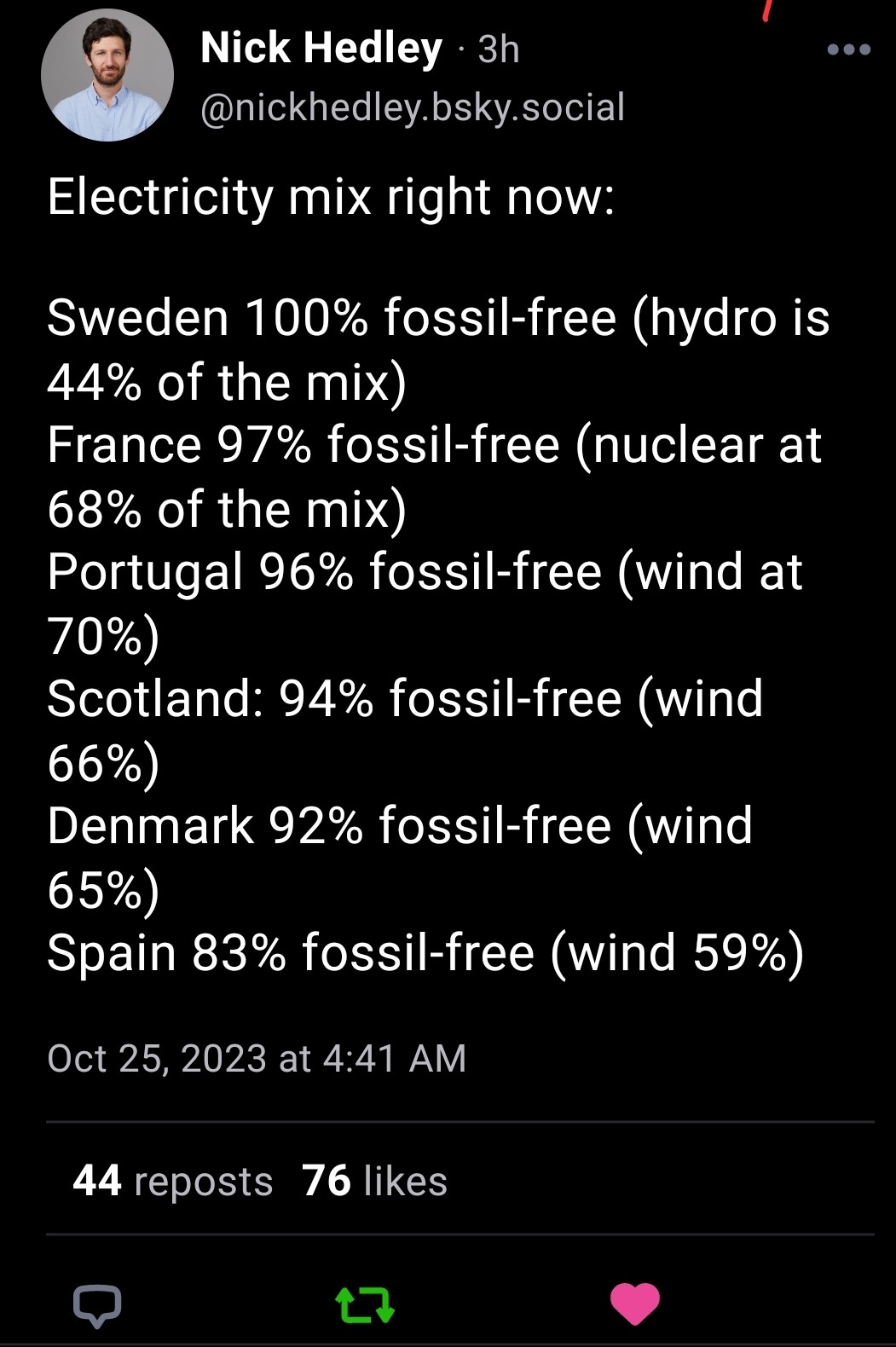this post was submitted on 25 Oct 2023
1002 points (93.7% liked)
Europe
8324 readers
1 users here now
News/Interesting Stories/Beautiful Pictures from Europe 🇪🇺
(Current banner: Thunder mountain, Germany, 🇩🇪 ) Feel free to post submissions for banner pictures
Rules
(This list is obviously incomplete, but it will get expanded when necessary)
- Be nice to each other (e.g. No direct insults against each other);
- No racism, antisemitism, dehumanisation of minorities or glorification of National Socialism allowed;
- No posts linking to mis-information funded by foreign states or billionaires.
Also check out [email protected]
founded 1 year ago
MODERATORS
you are viewing a single comment's thread
view the rest of the comments
view the rest of the comments


No, the south is lagging behind, because of incompetent governors, like the one in Bavaria who is well known for blocking the construction of wind turbines.
That's the popular opinion, but the reality is also that Wind Turbines are a no brainer in the North, and in the south it's often barely worth it
TL;DR:
From what I know, you are wrong.
Long version:
Thanks for pointing out that this might be just the popular opinion. I took this as an incent to dive a bit deeper and I look now especially at Bavaria, the state with the largest area in Germany, while also being one of the southern states.
Bavaria, with Söder as the governor, has been known and critisised for their lagging wind energy expansion. (I can provide you with various sources on that, but since you are already aware of this public opionion, I will provide them when requested.) This was also due to the 10H regulation, which mandated that wind turbines must maintain a minimum distance from residential buildings, equivalent to ten times their height, within certain designated areas. With heights of about 200 m for wind turbines, this means a distance of at least 2 km to residental areas. As a consequence this renders the usable area for wind energy in Bavaria to less than 0,05 % of it's size and effectively stopped progress in the construction and installation of wind energy plants. Source: https://kommunalwiki.boell.de/index.php/10H-Regelung
This regulation was loosened a bit in November 2022, some exceptions were made and the minimum distance was reduced to 1000 m . Source: https://www.verkuendung-bayern.de/gvbl/2022-650/
That loosening should allow for 800 to 1000 new wind turbines (Number sources: 800: https://www.sueddeutsche.de/bayern/bayern-windkraft-gesetz-kritik-1.5642558 , 1000: https://www.bayern.de/bayerischer-landtag-beschliet-lockerung-von-10h/ ). However, of those 1000 wind turbines exactly 4 were constructed and put into operation about one year after loosening the regulation (well, there were 5 constructed, but one was deconstructed again, lol). Source: https://www.br.de/nachrichten/bayern/bayern-hat-2023-bislang-vier-windraeder-genehmigt-faktenfuchs,Tqwfrvt .
What a marvellous achievement... /s
Moving on to the next point. You said, that wind turbines are often barely worth it in the southern states. Still looking at Bavaria, the "Energie Atlas" (energy atlas) of the state's government says:
https://www.energieatlas.bayern.de/thema_wind/potenzial
Translation by me:
Since wind speeds increase with height, good power yields can be generated in numerous Bavarian regions due to todays modern, technologically advanced and higher wind energy plants.
Some contributing factors are also that wind turbines are getting cheaper ( https://www.nature.com/articles/s41560-021-00810-z ) and in Germany there are subsidies for renewable energy sources, including wind energy ( there is the Erneuerbare-Energien-Gesetz (renewable energy law) for that, e.g., https://www.gesetze-im-internet.de/eeg_2014/__28.html , https://www.kfw.de/inlandsfoerderung/Unternehmen/Energie-Umwelt/F%C3%B6rderprodukte/Erneuerbare-Energien-Standard-(270)/?kfwmc=vt.sea.bing.SEA_VT_EEU_Windkraft_GC_F%C3%B6rderung.Windkraft-Foerderung_GC.windkraft%20f%C3%B6rderung&wt_cc1=umwelt&wt_cc2=unt|energie-umwelt&wt_cc3=78753109004179_78752692575892_bp_m, there are various resources on that and I'm too lazy to list more of them now ).
Even though wind speeds are not that high in Bavaria, it is surely far from "barely worth it". If you disagree, please provide reasons and according sources for your conclusion.
Your TLDR didn't quite catch me there. I don't think we're disagreeing actually. I know all about that first point of yours and I'm entirely with you - the red tape is stupid and should go away. Wherever turbines are worth it they should happen
My example was probably one of the outliers, and surely also due to poor management in part. But the point is, in the long term these turbines need to work without subsidies - and that's much more likely in the North (or some elevated locations in Bavaria that are not protected)